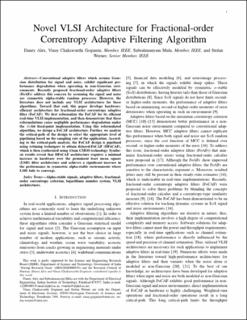| dc.contributor.author | Alex, Daney | |
| dc.contributor.author | Gogineni, Vinay Chakravarthi | |
| dc.contributor.author | Mula, Subrahmanyam | |
| dc.contributor.author | Werner, Stefan | |
| dc.date.accessioned | 2023-01-27T07:06:54Z | |
| dc.date.available | 2023-01-27T07:06:54Z | |
| dc.date.created | 2022-10-10T12:45:19Z | |
| dc.date.issued | 2022 | |
| dc.identifier.citation | IEEE Transactions on Very Large Scale Integration (vlsi) Systems. 2022, 30 (7), 893-904. | en_US |
| dc.identifier.issn | 1063-8210 | |
| dc.identifier.uri | https://hdl.handle.net/11250/3046720 | |
| dc.description.abstract | Conventional adaptive filters, which assume Gaussian distribution for signal and noise, exhibit significant performance degradation when operating in non-Gaussian environments. Recently proposed fractional-order adaptive filters (FoAFs) address this concern by assuming that the signal and noise are symmetric α -stable random processes. However, the literature does not include any VLSI architectures for these algorithms. Toward that end, this article develops hardware-efficient architecture for fractional-order correntropy adaptive filter (FoCAF). We first reformulate the FoCAF for its efficient real-time VLSI implementation and then demonstrate that these reformulations cause negligible performance degradation under the 16-bit fixed-point implementation. Using this reformulated algorithm, we design an FoCAF architecture. Furthermore, we analyze the critical path of the design to select the appropriate level of pipelining based on the sampling rate of the application. According to the critical-path analysis, the FoCAF design is pipelined using retiming techniques to obtain delayed FoCAF (DFoCAF), which is then synthesized using 45 -nm CMOS technology. Synthesis results reveal that DFoCAF architecture requires a minimal increase in hardware over the prominent least mean square (LMS) filter architecture and achieves a significant increase in the performance in symmetric α -stable environments where LMS fails to converge. | en_US |
| dc.language.iso | eng | en_US |
| dc.publisher | IEEE | en_US |
| dc.title | Novel VLSI Architecture for Fractional-Order Correntropy Adaptive Filtering Algorithm | en_US |
| dc.title.alternative | Novel VLSI Architecture for Fractional-Order Correntropy Adaptive Filtering Algorithm | en_US |
| dc.type | Journal article | en_US |
| dc.type | Peer reviewed | en_US |
| dc.description.version | acceptedVersion | en_US |
| dc.rights.holder | © 2022 IEEE. Personal use of this material is permitted. Permission from IEEE must be obtained for all other uses, in any current or future media, including reprinting/republishing this material for advertising or promotional purposes, creating new collective works, for resale or redistribution to servers or lists, or reuse of any copyrighted component of this work in other works. | en_US |
| dc.source.pagenumber | 893-904 | en_US |
| dc.source.volume | 30 | en_US |
| dc.source.journal | IEEE Transactions on Very Large Scale Integration (vlsi) Systems | en_US |
| dc.source.issue | 7 | en_US |
| dc.identifier.doi | 10.1109/TVLSI.2022.3169010 | |
| dc.identifier.cristin | 2060045 | |
| cristin.ispublished | true | |
| cristin.fulltext | postprint | |
| cristin.qualitycode | 1 | |
